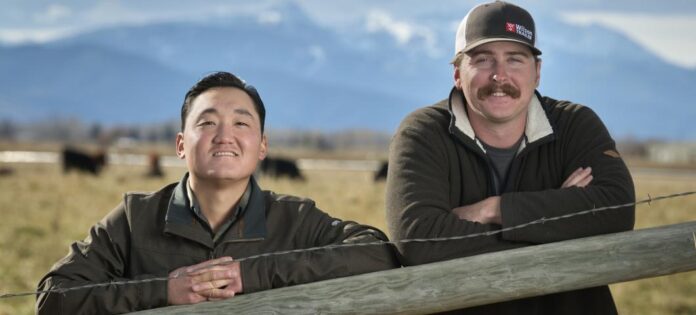BOZEMAN – One of Montana State University’s newest degree programs in the College of Agriculture has grown significantly since its creation in 2020 and, along with that growth, has developed a community of student veterans drawn to the ranching industry.
MSU’s Dan Scott Ranch Management Program saw its first student graduate with a ranching systems degree in 2021. Now with 31 students, the program, housed in the Department of Animal and Range Sciences, includes interdisciplinary coursework combining business, economics and environmental science with animal husbandry, range management and on-ranch internships. The aim of the program is to prepare the next generation of ranch managers with a well-rounded set of skills no matter where the industry takes them.
Of those 31, four current ranching systems students are also veterans, one of the highest proportions of any MSU program. For Greg Collins, who will graduate in May, the program was a natural fit after his time in the Army.
“I didn’t really know where I wanted to go, but I knew I wanted it to be agriculture,” said Collins, who is originally from Idaho. “I heard about Dan Scott and joined the program at MSU and now it’s been four years.”
Collins said he was particularly drawn by the internship aspect of the program, which pairs students with Montana ranches for two summers of hands-on work. He interned with a ranch outside of Augusta and also works at MSU’s Bozeman Agricultural Research and Teaching Farm during the academic year.
Kellen Marlow, the BART Farm’s livestock operations manager, is himself an Army veteran and an MSU graduate. In working with Collins and another veteran ranching systems student, Carlo Giovannitti, Marlow said he sees his past self. After their service, he said student veterans bring a well-developed work ethic to their higher education.
“These young people come from the military and have their goals set, they’re eager to learn and listen and they really want to make a difference,” said Marlow. “They’re sponges for information, trying to learn as much about ranching and agriculture as they possibly can, to help them in their future endeavors.”
In addition, Marlow said MSU’s wealth of resources for student veterans helps to ease the transition into higher education. The university was named one of the top three most military-friendly schools in the nation in 2022, and Rachel Frost, head of the Dan Scott Ranch Management Program, partners with MSU’s Veteran Services Office each year to provide guidance to students who think ranching systems may be the degree for them.
As for what draws student veterans to the program in such a high proportion, Jeff Courchaine said the requirements for success for careers in both agriculture and the military overlap in numerous ways.
“I think that the reason that I have been drawn to ranching is because it fulfills some of the main reasons I went in the military, which was service, being able to give back,” said Courchaine, who spent 11 years in the Army before moving to Bozeman in 2021. “Agriculture is obviously a critical component of having a country. There’s a purpose to it, there’s a higher end state to what you’re doing.”
For Courchaine, another draw to ranching systems was the opportunity for hands-on work through internships and preparation for a career away from a desk. After a ranch internship near Big Timber, he feels he made the right academic decision.
“I think the types of things you look for when you go into the military are the same types of things that ranching offers,” he said. “Just looking at the programs in the degree, it gives you a good start, in terms of the academics, to prepare you. I would imagine if you want to get into the ranching systems degree, it’s easier to do now. I think it’s going to continue to grow.”
Frost noted the exceptional leadership student veterans bring to a new and developing academic unit on MSU’s campus. Collins, who entered the program during the COVID-19 pandemic, is the only member of his academic cohort. But, Frost said, that didn’t stop him from taking the initiative to build a strong community within the program.
“Greg really owned his education, took advantage of every learning opportunity. He’s a cohort of one,” said Frost. “But he would take it upon himself to reach out to the cohort below. He’s bringing his leadership skills from the military, and he is implementing those within this academic program, to create cohesion among the students in ranching systems.”
Frost said that collaboration with MSU’s Veteran Services Office has been instrumental in recruiting and supporting the student service members on campus, a sentiment Collins echoed. As he prepares to graduate, he is now serving on the interview committee for students interested in ranching systems.
Students join the program in their second year at MSU with a maximum annual cohort size of 10, but Collins said the smaller group makes it an ideal environment for connection. He hopes that the trend of student veterans in the program continues and had a word of advice for those interested in exploring it.
“MSU has got some of the best resources. If you tap into that network, those people will guide you in the right direction,” he said. “If you know what you want to do and come with the drive, it’s very easy to flourish in this program. I hope students get into agriculture, know where their food is coming from and become that pivotal aspect in this industry. The Dan Scott program is doing a tremendous job of getting that young vigor into agriculture.”
By:




